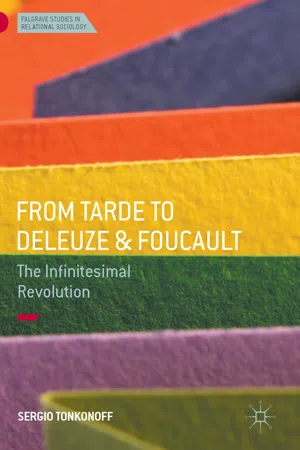
This is a test
- English
- ePUB (mobile friendly)
- Available on iOS & Android
eBook - ePub
Book details
Book preview
Table of contents
Citations
About This Book
This bookposits that a singular paradigm in social theory can be discovered by reconstructing the conceptual grammar of Gabriel Tarde's micro-sociology and by understanding the ways in which Gilles Deleuze's micro-politics and Michel Foucault's micro-physics have engaged with it. This is articulated in the infinite social multiplicity-invention-imitation-opposition-open system. Guided by infinitist ontology and an epistemology of infinitesimal difference, this paradigm offers a micro-socio-logic capable of producing new ways of understanding social life and its vicissitudes. In the field of social theory, this can be called the infinitesimal revolution.
Frequently asked questions
At the moment all of our mobile-responsive ePub books are available to download via the app. Most of our PDFs are also available to download and we're working on making the final remaining ones downloadable now. Learn more here.
Both plans give you full access to the library and all of Perlego’s features. The only differences are the price and subscription period: With the annual plan you’ll save around 30% compared to 12 months on the monthly plan.
We are an online textbook subscription service, where you can get access to an entire online library for less than the price of a single book per month. With over 1 million books across 1000+ topics, we’ve got you covered! Learn more here.
Look out for the read-aloud symbol on your next book to see if you can listen to it. The read-aloud tool reads text aloud for you, highlighting the text as it is being read. You can pause it, speed it up and slow it down. Learn more here.
Yes, you can access From Tarde to Deleuze and Foucault by Sergio Tonkonoff in PDF and/or ePUB format, as well as other popular books in Ciencias sociales & Sociología. We have over one million books available in our catalogue for you to explore.
Information
Topic
Ciencias socialesSubtopic
SociologíaBibliography
- Alliez, É. (1999) Tarde et le problème de la constitution. In G. Tarde (ed.) Monadologie et Sociologie . Paris: Les Empêcheurs de Penser en Rond, pp. 9–32.
- Alliez, É. (2001) Différence et répétition de Gabriel Tarde. Multitudes – Mineure: Tarde intempestif , 4 (7), pp. 171–176. Crossref
- Alliez, É. (2009) Gabriel Tarde. In G. Jones and J. Roffe (eds.) Deleuze’s Philosophical Lineage . Edinburgh: Edinburgh University Press, pp. 209–219.
- Althusser, L. (1964) Lire le Capital . París: Maspero.
- Althusser, L. (1965) Pour Marx . Paris: Maspero.
- Arnaud, P. (1969) Sociologie de Comte . Paris: Presses Universitaires de France.
- Barry, A., T. Osborne, and N. Rose (eds.) (1996) Foucault and Political Reason: Liberalism, Neo-Liberalism, and Rationalities of Government . Chicago: University of Chicago Press.
- Barthes, R. (1985) L’aventure sémiologique . Paris: Seuil.
- Bergson, H. (1965) Creative Mind . Totowa, NJ: Littlefield, Adams & Co.
- Bergson, H. (1991) Matter and Memory . New York: Zone Books.
- Blondel, C. (1928) Introduction à la psychologie Collective . Paris: Armand Colin.
- Boudon, R. (1971) La Crise de la sociologie . Questions d’epistémologie sociologique . Paris: Droz.
- Bouglé, C. (1905) Un sociologue individualiste: Gabriel Tarde. Revue de Paris , 10, pp. 294–316.
- Bourdieu, P. (1990a) In Other Words: Essays Toward a Reflexive Social Science . Cambridge: Polity Press.
- Bourdieu, P. (1990b) The Logic of Practice . Stanford, CA: Stanford University Press.
- Candea, M. (ed.) (2010) The Social After Gabriel Tarde: Debates and Assessments . New York: Routledge.
- Clark, T. (1969) Introduction. In T. Clark (ed.) Gabriel Tarde on Communication and Social Influence . Chicago: University of Chicago Press.
- Clet, J. (2001) Tarde: une nouvelle monadologie. Multitudes , 4 (7), pp. 186–192.
- Comte, A. (1998) System of Positive Polity , reprinted in part in August Comte and Positivism: The Essential Writings, edited by Gertrud Lenzer. New Brunswick: Transaction publishers.
- DeLanda, M. (1997) A Thousand Years of Nonlinear History . Cambridge: MIT Press.
- DeLanda, M. (2002) Intensive Science and Virtual Philosophy . London & New York: Continuum.
- DeLanda, M. (2006a) A New Philosophy of Society: Assemblage Theory and Social Complexity . London & New York: Continuum.
- DeLanda, M. (2006b) Deleuzian Social Ontology and Assemblage. In Theory. M. Fuglsang and B. M. Sorensen (eds.), Deleuze and the Social . Edinburgh: Edinburgh University Press, pp. 250–266. Crossref
- Deleuze, G. (1981) Lesson of 10/02/81 in http://www2.univ-paris8.fr/deleuze/article.php3?id_article=54 [accessed 21/04/2015].
- Deleuze, G. (1983) Nietzsche and Philosophy . New York: Continuum.
- Deleuze, G. (1986) Foucault . París: Minuit.
- Deleuze, G. (1988) Bergsonism , trans. H. Tomlinson and B. Habberjam. New York: Zone Books.
- Deleuze, G. (1992) What is a Dispositif? In T. J. Armstrong (ed.), Michel Foucault Philosopher . New York: Routledge. Harvester Wheatsheaf, pp. 159–168.
- Deleuze, G. (1993) The Fold: Leibniz and the Baroque , trans. T. Conley. Minneapolis and London: University of Minnesota Press.
- Deleuze, G. (1994) Difference and Repetition , trans. P. Patton. London: The Athlone Press.
- Deleuze, G. (1995) Negotiations, 1972–1990 , trans. M. Joughin. New York: Columbia University Press.
- Deleuze, G. (1996) L’actuel et le virtuel. In G. Deleuze and C. Parnet (ed.), Dialogues , 2nd edn. Paris: Flammarion.
- Deleuze, G. (2003) Deux ré...
Table of contents
- Cover
- Front Matter
- Microsociology, Micropolitics, and Microphysics: Toward the Paradigm of Infinitesimal Difference
- Tarde and the Infinitesimal Sociology
- Individuals, Publics, and Crowds. Where Does Social Change Come From?
- Diffusion or War? Foucault as a Reader of Tarde
- Desire, Assemblages, Machines. Deleuze et al
- The Reason for Being of the Finite
- Back Matter